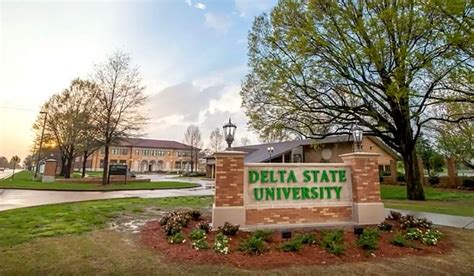Delta State University (DSU) is a public university located in Cleveland, Mississippi. It was founded in 1924 and has an enrollment of over 5,000 students. DSU offers over 100 undergraduate and graduate degree programs.

Tuition and Fees
The cost of attendance at DSU varies depending on the student’s residency status and the program of study. The following table shows the estimated tuition and fees for the 2023-2024 academic year:
| Residency Status | Undergraduate Tuition | Graduate Tuition |
|---|---|---|
| In-state | $8,184 | $9,780 |
| Out-of-state | $15,468 | $18,060 |
Additional Fees:
In addition to tuition and fees, students may also be required to pay for the following expenses:
- Housing: $4,000 – $8,000 per year
- Meal plan: $2,000 – $4,000 per year
- Books and supplies: $1,000 – $2,000 per year
- Transportation: $1,000 – $2,000 per year
- Personal expenses: $1,000 – $2,000 per year
Financial Aid
DSU offers a variety of financial aid programs to help students pay for college. These programs include scholarships, grants, loans, and work-study.
Scholarships:
DSU offers a variety of scholarships to students based on their academic achievement, financial need, and other criteria. The following are some of the most popular scholarships offered by DSU:
- Delta State University Academic Scholarship
- Delta State University Presidential Scholarship
- Delta State University Foundation Scholarship
- Delta State University Alumni Scholarship
Grants:
DSU offers a variety of grants to students based on their financial need. The following are some of the most popular grants offered by DSU:
- Federal Pell Grant
- Federal Supplemental Educational Opportunity Grant (SEOG)
- Mississippi Eminent Scholars Grant
Loans:
DSU offers a variety of loans to students to help them pay for college. The following are some of the most popular loans offered by DSU:
- Federal Direct Subsidized Loan
- Federal Direct Unsubsidized Loan
- Federal Direct PLUS Loan
Work-Study:
DSU offers a work-study program that allows students to earn money to help pay for college. Students who participate in work-study work on campus for a variety of employers.
How to Apply for Financial Aid
To apply for financial aid at DSU, students must complete the Free Application for Federal Student Aid (FAFSA). The FAFSA is available online at fafsa.ed.gov.
Common Mistakes to Avoid
When applying for financial aid, there are a few common mistakes that students should avoid. These mistakes include:
- Not completing the FAFSA on time
- Not providing all of the required information on the FAFSA
- Not submitting the FAFSA to the correct school
- Not applying for all of the financial aid programs for which you are eligible
- Not accepting all of the financial aid that you are offered
Why Financial Aid Matters
Financial aid can make a big difference in your ability to pay for college. If you are eligible for financial aid, it is important to apply for it. Financial aid can help you pay for tuition, fees, housing, food, and other expenses.
Benefits of Financial Aid
There are many benefits to receiving financial aid, including:
- Reducing your out-of-pocket costs for college
- Making it possible to attend college
- Allowing you to focus on your studies
- Helping you to graduate from college
FAQs
1. What is the deadline to apply for financial aid?
The deadline to apply for financial aid is June 30th. However, it is important to apply as early as possible to maximize your chances of receiving financial aid.
2. What is the FAFSA?
The FAFSA is the Free Application for Federal Student Aid. It is used to determine your eligibility for federal and state financial aid.
3. What is the EFC?
The EFC is the Expected Family Contribution. It is a measure of your family’s financial strength and is used to determine your eligibility for need-based financial aid.
4. What is the difference between a grant and a loan?
A grant is free money that does not have to be repaid. A loan is money that you borrow and must repay with interest.
5. What is work-study?
Work-study is a program that allows students to earn money to help pay for college. Students who participate in work-study work on campus for a variety of employers.
6. How can I appeal my financial aid award?
If you are not satisfied with your financial aid award, you can appeal it. To appeal your award, you must write a letter to the financial aid office explaining why you believe your award should be increased.
7. What is the Satisfactory Academic Progress (SAP) policy?
The SAP policy is a set of requirements that students must meet in order to maintain their financial aid eligibility. These requirements include maintaining a certain GPA, completing a certain number of credit hours each semester, and making progress towards a degree.
8. What happens if I withdraw from school?
If you withdraw from school, you may be required to repay all or a portion of your financial aid.
